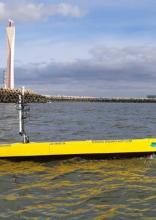On 20 November 2020, the VLIZ USV ('Uncrewed Surface Vehicle') Adhemar was the first Belgian unmanned vessel to succeed, with the help of pilots in a control center, in entering and leaving a commercial seaport. This successful, completely unmanned research mission from the port of Ostend is part of measurements of the underwater noise that can be carried out with this silent robot. The success went along with significant improvements in the operational capacity of USV Adhemar, based on previous trial runs. For example, the original vessel (Autonaut USV) underwent a number of technological innovations. The communication speed between the onshore control center and USV Adhemar was significantly increased in order to be able to react quickly to unforeseen situations at sea. And the platform's propulsion was given a major upgrade in order to be able to navigate smoothly in the often rough North Sea conditions.
Even if it still sounds like distant future to some, a handful of trial runs with unmanned vessels have already been carried out on our North Sea in recent years. Some of these were part of the start-up of the Marine Robotics Centre (MRC) of VLIZ. In 2019 there was also the successful crossing of the English Channel by an English unmanned vessel to Ostend and back. However, USV Adhemar was the first Belgian unmanned platform that sailed entirely from a control center into and out of a commercial seaport. By analogy with self-propelled cars, engineers have been thinking for some time about how vessels (ships and robotic platforms) can operate without a crew in a challenging sea environment. In time, unmanned vessels will make a number of tasks at sea more efficient and safer. With the 'Marine Robotics Centre', equipped with three full-fledged and high-tech robots (USV Adhemar, AUV Barabas, ROV Zonnebloem), Flanders has been fully committed to this evolution with the Flanders Marine Institute (VLIZ) since 2018. The aim is to use robotics platforms to perform more and better measurements for marine research and innovation projects and for large infrastructure projects (e.g. offshore wind farms). The recent policy statement of the new Minister competent for the North Sea, Vincent Van Quickenborne, also explicitly mentions autonomous navigation. In this context, the 'Marine Robotics Centre' acts as a pioneer for unmanned sailing in our part of the North Sea.
In parallel with VLIZ trials with USV Adhemar, the competent authorities are working hard on the legislative framework for unmanned navigation at sea. The FPS Mobility and the Maritime Rescue and Coordination Center (MRCC) of the Agency for Maritime Services and Coast (MDK) supervised and approved the USV tests with a view to ensuring maritime safety. This made it possible to establish confidence and to work towards a completely unmanned mission through sufficiently safe intermediate steps. One of the next challenges is, in addition to the expansion of the capacity, to develop the regulations for unmanned (research) vessels in order to enable longer missions at sea - with continued deployment during the night. In this context, VLIZ is committed to increasing the range of unmanned vessels and to the further development of a control center ashore. Building on the achievements with USV Adhemar, the ultimate goal is to make continuous (24/7) real-time observations at sea possible with a fleet of unmanned vessels. These robotics platforms are highly complementary with the state-of-the-art research vessel RV Simon Stevin and will together be able to provide much needed observation capacity for research and innovation projects and new developments at sea in the future.
This milestone has been made possible thanks to the investment of the Flemish Government in the Marine Robotics Centre of VLIZ.
Flemish Minister of Innovation, Hilde Crevits: "Flanders invests in innovation projects at sea because our Blue Economy and marine knowledge belong to the absolute world top. Unmanned vessels and marine robotics will certainly play a key role in the Blue Economy of the future. The Marine Robotics Centre of VLIZ in Ostend is taking the pioneering role and together with its partners is taking important steps towards the operational deployment of unmanned vessels at sea. Today we prove with the first Belgian unmanned vessel that the port of Ostend has sailed outside and inside that our innovative projects lead to concrete results".
Deputy prime minister and minister of the North Sea, Vincent Van Quickenborne: "Once again our North Sea is the scene for innovative projects. Several Belgian companies are investing in this technology. This test has received an ad hoc approval. But it is important that there is a permanent legal framework in place that can give an extra boost to our pioneering role. I want to work that out before the summer of 2021 and thus create a level playing field for this innovation industry".
Footage & Images:
http://www.vliz.be/nl/persbericht/eerste-belgische-onbemande-vaartuig-oostende
Press contacts:
- Bart De Smet (VLIZ): bart.desmet@vliz.be | +32-(0)478-56 96 78
- Jan Seys (VLIZ): jan.seys@vliz.be | +32-(0)478-37 64 13
- Arne De Brabandere (woordvoerder Vlaams minister Hilde Crevits): arne.debrabandere@vlaanderen.be | +32-(0)496-02 98 89
- Anne-Sophie Moerman (MDK): anne-sophie.moerman@mow.vlaanderen.be |+32-(0)474-66 15 78
- Thomas De Spiegelaere (FOD Mobiliteit en Vervoer –): pers@mobilit.fgov.be | +32-(0)485-19 59 63


